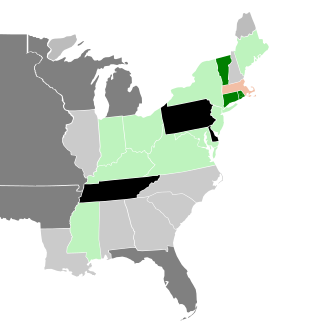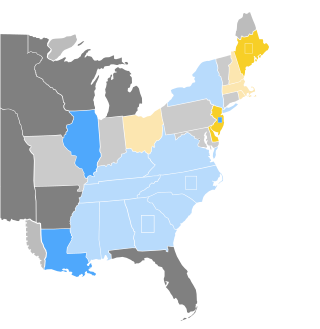A special election was held in New Jersey's at-large congressional district on October 8, 1821, to fill a vacancy caused by the death of John Linn (DR) on January 5, 1821, prior to the start of the 17th Congress. [1]
| Elections in New Jersey |
|---|
 |
A special election was held in New Jersey's at-large congressional district on October 8, 1821, to fill a vacancy caused by the death of John Linn (DR) on January 5, 1821, prior to the start of the 17th Congress. [1]
| Candidate | Party | Votes [2] | Percent |
|---|---|---|---|
| Lewis Condict | Democratic-Republican | 9,900 | 46.5% |
| Robert W. Rutherford | Democratic-Republican | 6,662 | 31.3% |
| James Parker | Federalist | 4,737 | 22.2% |
Condict took his seat with the rest of New Jersey's delegation at the start of the 1st session of the 17th Congress.

The 1822–23 United States House of Representatives elections were held on various dates in various states between July 1, 1822, and August 14, 1823. Each state set its own date for its elections to the House of Representatives before the first session of the 18th United States Congress convened on December 1, 1823. They occurred during President James Monroe's second term.
The 1820–21 United States House of Representatives elections were held on various dates in various states between July 3, 1820, and August 10, 1821. Each state set its own date for its elections to the House of Representatives before the first session of the 17th United States Congress convened on December 3, 1821. They coincided with President James Monroe winning reelection unopposed.

The 1820–21 United States Senate elections were held on various dates in various states, corresponding with James Monroe's landslide re-election. As these U.S. Senate elections were prior to the ratification of the Seventeenth Amendment in 1913, senators were chosen by state legislatures. Senators were elected over a wide range of time throughout 1820 and 1821, and a seat may have been filled months late or remained vacant due to legislative deadlock. In these elections, terms were up for the senators in Class 1.

The 1798–99 United States Senate elections were held on various dates in various states. As these U.S. Senate elections were prior to the ratification of the Seventeenth Amendment in 1913, senators were chosen by state legislatures. Senators were elected over a wide range of time throughout 1798 and 1799, and a seat may have been filled months late or remained vacant due to legislative deadlock. In these elections, terms were up for the senators in Class 2.

the 1828–29 United States Senate elections were held on various dates in various states. As these United States Senate elections were prior to the ratification of the 17th Amendment to the United States Constitution in 1913, senators were chosen by State legislature United States. Senators were elected over a wide range of time throughout 1828 and 1829, and a seat may have been filled months late or remained vacant due to legislative deadlock. In these elections, terms were up for the senators in Class 2.

The 1821 United States House of Representatives elections in New York were held from April 24 to 26, 1821, to elect 27 U.S. Representatives to represent the State of New York in the United States House of Representatives of the 17th United States Congress.

Pennsylvania elected its members October 10, 1820.

Special elections were held in Maryland's 5th congressional district on January 1, 1823, to fill vacancies in the 17th and 18th Congresses caused by the resignation of Samuel Smith (DR) after being elected to the Senate. Smith had been re-elected to the House in October. His resignation therefore created vacancies both in the remainder of the 17th Congress and in the 18th Congress.

On December 20, 1820, Jesse Slocumb (DR) of North Carolina's 4th district died. A special election was held to fill the resulting vacancy

On May 15, 1820, David Fullerton (DR) of Pennsylvania's 5th district resigned from his seat in the House of Representatives. A special election was held on October 10, 1820 to fill the resulting vacancy. This election was held on the same day as the election for the 17th Congress.

On September 7, 1821, Representative-elect Selah Tuthill (DR) of New York's 6th district died before the first meeting of the 17th Congress. A special election was held November 6–8, 1821 to fill the resulting vacancy.
In 1821, Representative-elect John S. Richards (DR), who'd been elected to represent South Carolina's 9th district, declined to serve. A special election was held to fill the resulting, the first of two special elections in the 9th district for the 17th Congress.

In April, 1821, prior to the first meeting of the 17th Congress, Representative-elect James Duncan (DR) from Pennsylvania's 5th district resigned. A special election was held to fill the resulting vacancy on October 9, 1821.

On July 20, 1821, William Cox Ellis (F) from Pennsylvania's 10th district resigned. A special election was held to fill the resulting vacancy on October 9, 1821.

On May 8, 1822, the last day of the First Session of the 17th Congress, William Milnor (F) of Pennsylvania's 1st district resigned. A special election was held to fill the resulting vacancy on October 1, 1822, a week before the general elections for the 18th Congress.

On May 8, 1822, the last day of the First Session of the 17th Congress, Henry Baldwin (DR) of Pennsylvania's 14th district resigned from Congress. A special election was held on October 1, 1822 to fill the resulting vacancy.

On May 20, 1822, Samuel Moore (DR) of Pennsylvania's 6th district resigned. A special election was held on October 1, 1822 to fill the resulting vacancy.

On October 17, 1822, Ludwig Worman (F) of Pennsylvania's 7th district died in office. A special election was held to fill the resulting vacancy on December 10, 1822

Virginia elected its members in April 1821, after the term began but before the new Congress convened.